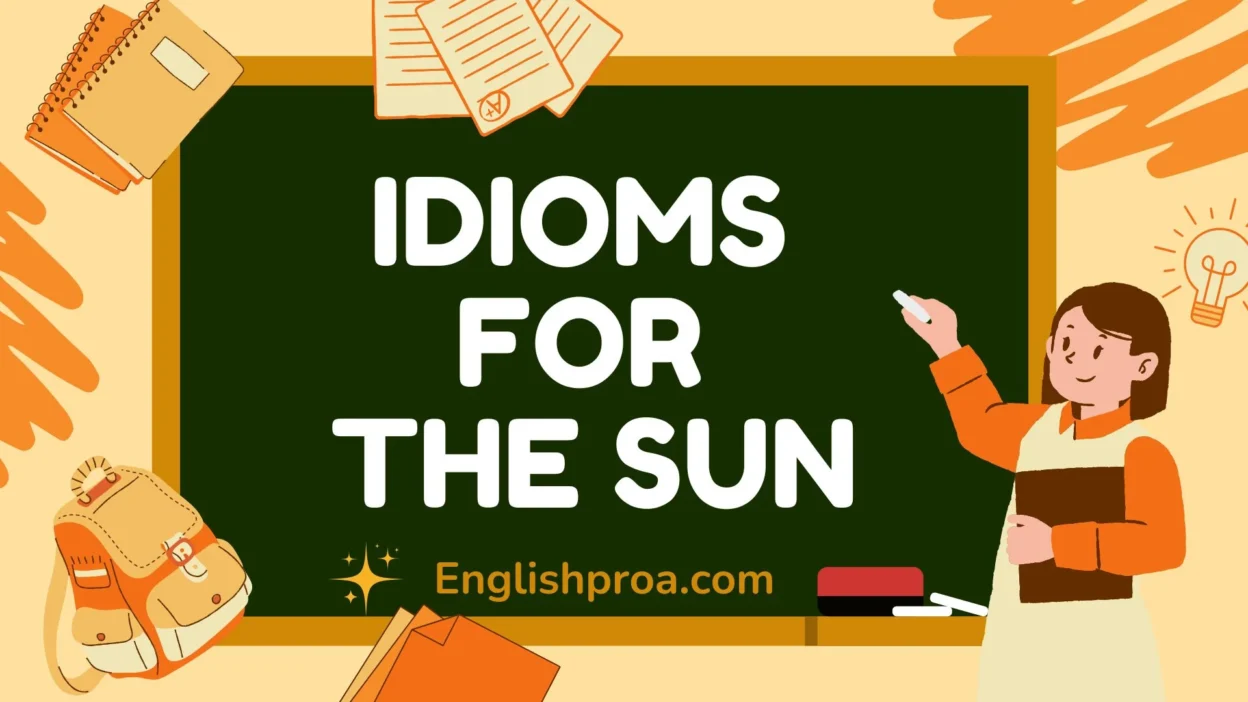The sun, in all its brilliance and warmth, is a symbol of light, life, and positivity. It touches everything around us, making it a perfect metaphor in language. Whether you’re discussing a bright day, someone’s cheerful personality, or a new beginning, idioms related to the sun can elevate your expression and add depth to your conversations.
In this article, we’ll explore 30 sun-related idioms that will help you communicate with warmth, care, and clarity. Each idiom is carefully chosen to ensure you can use it in meaningful, thoughtful ways.
1. A ray of sunshine
Meaning: A person or thing that brings happiness or positivity.
Example: Her smile is like a ray of sunshine on a gloomy day.
Best Use: Use it to describe someone who lifts the spirits of others.
Not to Use: Avoid using it in negative contexts.
Other Ways to Say: A beacon of light, a bright spot, a breath of fresh air.
2. Chasing the sun
Meaning: Trying to find something unattainable or constantly striving for something that seems just out of reach.
Example: He’s always chasing the sun, looking for the perfect vacation spot.
Best Use: Use it to convey ambition or a sense of adventure.
Not to Use: Avoid using it when talking about realistic goals.
Other Ways to Say: Reaching for the stars, aiming high, pursuing dreams.
3. Make hay while the sun shines
Meaning: Take advantage of an opportunity while it lasts.
Example: We should make hay while the sun shines and finish this project today.
Best Use: Ideal for situations where you have a limited opportunity to act.
Not to Use: Don’t use it when there’s no urgency or opportunity.
Other Ways to Say: Strike while the iron is hot, carpe diem, seize the moment.
4. Everything under the sun
Meaning: Referring to everything that exists or all possibilities.
Example: He knows everything under the sun about technology.
Best Use: Use it to describe someone’s wide-ranging knowledge.
Not to Use: Avoid when referring to something very specific.
Other Ways to Say: All things, every possible option, everything imaginable.
5. The sun will come out tomorrow
Meaning: Hopeful phrase implying that things will improve eventually.
Example: Don’t worry, the sun will come out tomorrow.
Best Use: Use it to encourage someone going through a tough time.
Not to Use: Avoid using it in situations that require immediate action.
Other Ways to Say: Things will get better, tomorrow is a new day, brighter days ahead.
6. Under the sun
Meaning: In the entire world or universe.
Example: There is no one like her under the sun.
Best Use: Use it to emphasize rarity or uniqueness.
Not to Use: Avoid when discussing something ordinary.
Other Ways to Say: In existence, on earth, anywhere.
7. Sunshine and rainbows
Meaning: Refers to an overly optimistic view of life.
Example: Life isn’t always sunshine and rainbows, but we can still find joy.
Best Use: Use it when discussing idealistic or overly positive views.
Not to Use: Avoid using it in serious or challenging contexts.
Other Ways to Say: Bright and happy, idealistic, perfect.
8. A place in the sun
Meaning: A situation or position that brings comfort or success.
Example: After years of hard work, he finally has a place in the sun.
Best Use: Use it to describe someone achieving success after a struggle.
Not to Use: Avoid using it for negative outcomes.
Other Ways to Say: A good spot, a position of power, success.
9. Don’t shine your light too brightly
Meaning: A warning against being too boastful or arrogant.
Example: She’s a great person, but she doesn’t need to shine her light too brightly.
Best Use: Use it to remind someone to stay humble.
Not to Use: Avoid using it in situations that require praise or recognition.
Other Ways to Say: Be modest, don’t show off, don’t brag.
10. The sun is setting on something
Meaning: Something is coming to an end or nearing completion.
Example: The sun is setting on this chapter of our project, but it’s time to move on.
Best Use: Use it when signaling the end of a phase or project.
Not to Use: Avoid using it for positive developments.
Other Ways to Say: Drawing to a close, ending, finishing up.
11. Like a moth to the flame
Meaning: Drawn irresistibly to something, even if it’s dangerous.
Example: She was like a moth to the flame, always going back to him despite the hurt.
Best Use: Use it to describe an attraction that’s hard to resist.
Not to Use: Avoid when discussing healthy relationships.
Other Ways to Say: Irresistible attraction, captivated by, drawn to.
12. A sunbeam in disguise
Meaning: Someone who brings joy and positivity but does not overtly show it.
Example: He’s such a sunbeam in disguise, always making everyone feel better without saying much.
Best Use: Ideal for someone who subtly brings happiness.
Not to Use: Avoid using it in negative or sarcastic contexts.
Other Ways to Say: Quiet joy-bringer, silent light, unspoken positivity.
13. Throw caution to the wind
Meaning: To act without worry or concern for consequences.
Example: Sometimes you just have to throw caution to the wind and take a chance.
Best Use: Use it when encouraging bold actions.
Not to Use: Avoid it when advising caution.
Other Ways to Say: Take a risk, act boldly, live on the edge.
14. Bright as the sun
Meaning: Extremely bright or radiant.
Example: Her smile is bright as the sun, lighting up the room.
Best Use: Use it to describe something or someone with an uplifting quality.
Not to Use: Avoid using it when describing something dull or lifeless.
Other Ways to Say: Radiant, glowing, shining.
15. A sun-drenched day
Meaning: A day filled with warm, bright sunlight.
Example: We spent the afternoon at the beach on a sun-drenched day.
Best Use: Perfect for describing beautiful, sunny weather.
Not to Use: Don’t use it in the context of a cloudy or rainy day.
Other Ways to Say: Sunny day, bright day, sun-filled day.
16. The golden hour
Meaning: The time just before sunset when the sunlight is soft and warm.
Example: We took our best photos during the golden hour, just as the sun was setting.
Best Use: Use it for moments of beauty and calm.
Not to Use: Avoid using it for mundane or unremarkable moments.
Other Ways to Say: Twilight, sunset hour, magic hour.
17. Sunrise in the eyes
Meaning: A look of hope, new beginnings, or possibility.
Example: She looked at the world with sunrise in her eyes, full of dreams and optimism.
Best Use: Ideal for describing someone with a hopeful outlook.
Not to Use: Avoid in negative or disillusioned contexts.
Other Ways to Say: Bright future, optimistic look, hopeful gaze.
18. Sun-kissed
Meaning: Touched or bronzed by the sun, usually referring to a tan.
Example: After the vacation, she came back sun-kissed and glowing.
Best Use: Use it to describe someone with a healthy tan.
Not to Use: Avoid using it when referring to someone pale or sickly.
Other Ways to Say: Tanned, glowing, bronzed.
19. Shooting for the stars
Meaning: Aiming for high, ambitious goals.
Example: He’s shooting for the stars, hoping to achieve something extraordinary.
Best Use: Use it to express high ambition and goals.
Not to Use: Avoid in situations where goals are modest.
Other Ways to Say: Dream big, reach for the sky, go after greatness.
20. Sunshine in a bottle
Meaning: Something or someone that encapsulates happiness and warmth.
Example: That child is like sunshine in a bottle, always spreading joy.
Best Use: Perfect for describing a cheerful, happy person.
Not to Use: Avoid using it for someone who is negative or gloomy.
Other Ways to Say: Bundle of joy, happiness personified, cheerful spirit.
21. It’s always darkest before the dawn
Meaning: Things often seem worse just before they improve.
Example: Hang in there – it’s always darkest before the dawn.
Best Use: Use it to encourage someone during difficult times.
Not to Use: Don’t use it for people who are experiencing minor difficulties.
Other Ways to Say: Light at the end of the tunnel, it will get better, after the storm.
22. Rise and shine
Meaning: Wake up and be active, usually with enthusiasm.
Example: It’s time to rise and shine, we have a big day ahead!
Best Use: Great for motivating someone to start the day energetically.
Not to Use: Avoid using it in a rushed or stressful context.
Other Ways to Say: Get moving, wake up, start your day.
23. A solar flare of emotions
Meaning: Intense and sudden bursts of emotion.
Example: His outburst was like a solar flare of emotions.
Best Use: Use when describing intense emotional moments.
Not to Use: Avoid using it for calm or subdued emotions.
Other Ways to Say: Burst of feelings, emotional explosion, sudden outburst.
24. Sun-dappled
Meaning: Light that filters through trees or other objects, creating patterns.
Example: They sat in the sun-dappled park, enjoying the quiet.
Best Use: Ideal for describing peaceful moments in nature.
Not to Use: Don’t use in urban or artificial contexts.
Other Ways to Say: Sunlit, shaded, light-filtered.
25. A bright day ahead
Meaning: Optimism and positivity about the future.
Example: After the meeting, he felt like there was a bright day ahead.
Best Use: Use it to inspire hope and motivation.
Not to Use: Avoid in negative or uncertain situations.
Other Ways to Say: A promising future, hopeful days, good things coming.
26. Burning the midnight oil
Meaning: Staying up late working on something.
Example: She was burning the midnight oil to finish her assignment.
Best Use: Use when referring to late-night work or study sessions.
Not to Use: Avoid when referring to something that doesn’t require effort.
Other Ways to Say: Working late, staying up late, late-night grind.
27. A solar system of thoughts
Meaning: A complex, interconnected web of ideas.
Example: His mind is like a solar system of thoughts, with each idea orbiting around another.
Best Use: Great for describing complex thinking.
Not to Use: Avoid in simple or straightforward situations.
Other Ways to Say: Web of ideas, intricate mind, connected thoughts.
28. Like a sunbeam through clouds
Meaning: Bringing light or hope to a gloomy situation.
Example: Her laughter was like a sunbeam through clouds, brightening everyone’s day.
Best Use: Use to describe someone who brings joy to a difficult time.
Not to Use: Avoid using it in purely negative contexts.
Other Ways to Say: Bright spot, mood-lifter, hope in dark times.
29. Sunshine on my shoulders
Meaning: The feeling of happiness and peace.
Example: I felt like sunshine on my shoulders after hearing that good news.
Best Use: Perfect for expressing joy and contentment.
Not to Use: Avoid using it in stressful or negative contexts.
Other Ways to Say: Peaceful, calm, happy.
30. To bask in the sun
Meaning: To enjoy warmth or relaxation, usually in a carefree manner.
Example: They were basking in the sun by the beach, enjoying every moment.
Best Use: Use when talking about taking a break or enjoying life.
Not to Use: Avoid using it in situations of stress or urgency.
Other Ways to Say: Relaxing, enjoying the moment, soaking up the rays.
FAQs
Q1: Can I use sun idioms in formal writing? Yes, as long as they’re used appropriately and don’t sound overly casual.
Q2: What’s the best way to practice using these idioms? Try incorporating them into everyday conversations or journaling.
Q3: Are there any sun idioms related to energy or vitality? Yes, phrases like “a ray of sunshine” or “bright as the sun” can express vitality.
Q4: How can I use these idioms to encourage someone? Use idioms like “the sun will come out tomorrow” to inspire hope and optimism.
Q5: Can these idioms be used in business writing? They can be used in informal business writing, but be cautious in more formal documents.
Conclusion
Incorporating sun idioms into your language allows you to express positivity, warmth, and hope in both your personal and professional life. Whether you’re offering encouragement, describing beauty, or sharing joy, these idioms provide a rich way to communicate. Use them thoughtfully to inspire, uplift, and connect with those around you.





